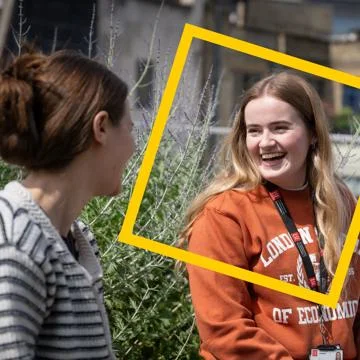Student Life

Wondering what it is like to study in the European Institute at LSE?
Find out more about the academic year, sources of support, and ways to get involved.

The Academic Year
The academic year at LSE is made up of three terms: Autumn Term (AT), Winter Term (WT), and Spring Term (ST).
- Welcome: The year begins with LSE's induction week, known as Welcome, or Autumn Term Week 0. This week is compulsory and students are expected to attend relevant Welcome events and activities. More details can be found on our Welcome page, including dates for the coming year.
- Autumn Term and Winter Term: The two teaching terms. Each is 11 weeks long, and each week is numbered e.g. Autumn Term Week 1 (AT WK 1).
- Reading Week: Most European Institute courses hold a Reading Week in Week 6 of AT and WT. The week is a time to catch up on past readings and prepare for the rest of term. It is not a vacation period, and you are expected to be on campus.
- Spring Term: Spring Term is 7 weeks long. There is no new teaching during this term. The first half is reserved for revision sessions, followed by exams and assessments. You will also be working on your dissertation/policy incubator/applied policy project during this period. You're expected to be on campus for the full duration of Spring Term.
- Summer: After Spring Term ends, you'll continue to work on your dissertation/policy incubator/applied projects. As a 12-month MSc student, you'll be considered to be in term-time until the official end date of your programme (listed on your offer letter). Students studying on a visa should be aware that this could have implications for you if you plan to take on paid or unpaid work while still a student. Please see the guidance here and contact the Student Engagement and Advice Team with any specific queries relating to your visa.

Student Support
There is lots of support available to you to help you thrive academically and personally during your studies.
European Institute Programmes and Student Support Team
The EI Programmes Team is the first port of call for questions that may come up during your studies. They can be contacted at ei@lse.ac.uk.
- Adam Judge, Deputy Institute Manager (Programmes and Student Support)
- Wagio Waigi, MSc Programmes Manager
- Sarah Doerfler, MSc and PhD Programmes Manager
- Stephen Jenner, Programmes Manager (MSc Double Degrees, Extended Education, and Projects)
Department Senior Student Adviser (DSSA)
The European Institute's DSSA is Charlotte Ennis. EI students can book appointments with Charlotte to discuss support, navigating life at LSE, and wellbeing.
- Watch our World Mental Health Day video to hear from Charlotte about support in the European Institute and at LSE!
- Check out a quick overview of the LSE Student Wellbeing Service to understand the resources available to you.
Academic Support
- Academic Mentor: You will be assigned an Academic Mentor during Welcome. Your Academic Mentor is a key point of contact in your academic department. Their role is to keep an overview of your academic progress and overall wellbeing during your time at the School. They can provide guidance and coaching on the wide range of academic and pastoral topics that might come up during your time at LSE. You can find out more about Academic Mentors here.
- Programme Director: Programme Directors have oversight over a programme of study. If you are unable to get in touch with your Academic Mentor for any reason, your Programme Director is your next port of call for advice and support.
- Course Convenor: Each course at LSE has a course leader, known as a course convenor, who has oversight of an individual course. Some course convenors do all of the teaching on a course, and others will oversee a group of lecturers and seminar class teachers. Contact details for course convenors are available on the course guide.

Student Voice
Get involved and shape your time in the EI
The student voice plays a central role in shaping your experience with us at the European Institute and helps us to make positive change for future cohorts too! Throughout your studies, you’ll have opportunities to provide feedback through surveys and focus groups.
One of the primary ways that we respond to your student voice is the Staff/Student Liaison Committees (SSLC). The SSLC is attended by MSc Student Academic Representatives from each programme. They offer feedback on what’s going well and what can be improved. Student Academic Representatives receive training from the Students’ Union and develop valuable communication and negotiation skills.
To find out more about being a Representative, visit the SU's Make a Change website.
